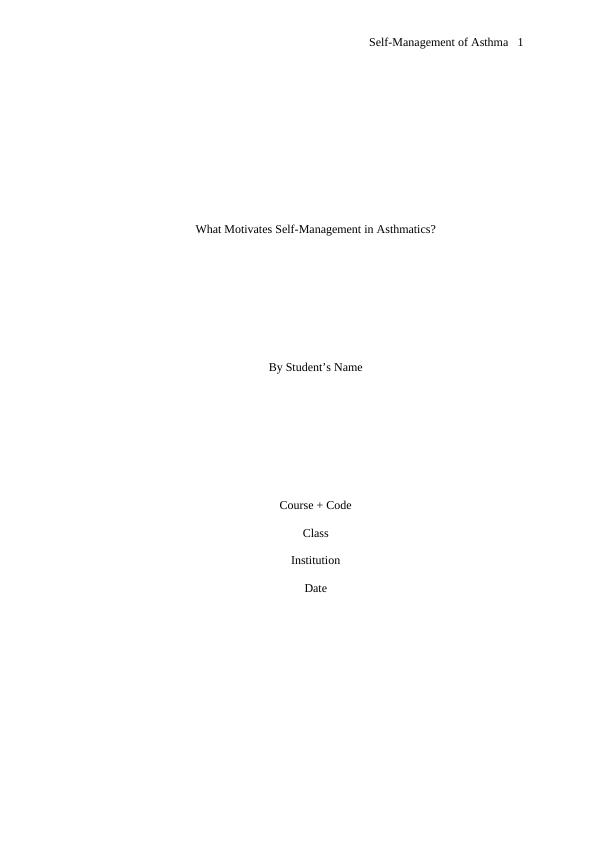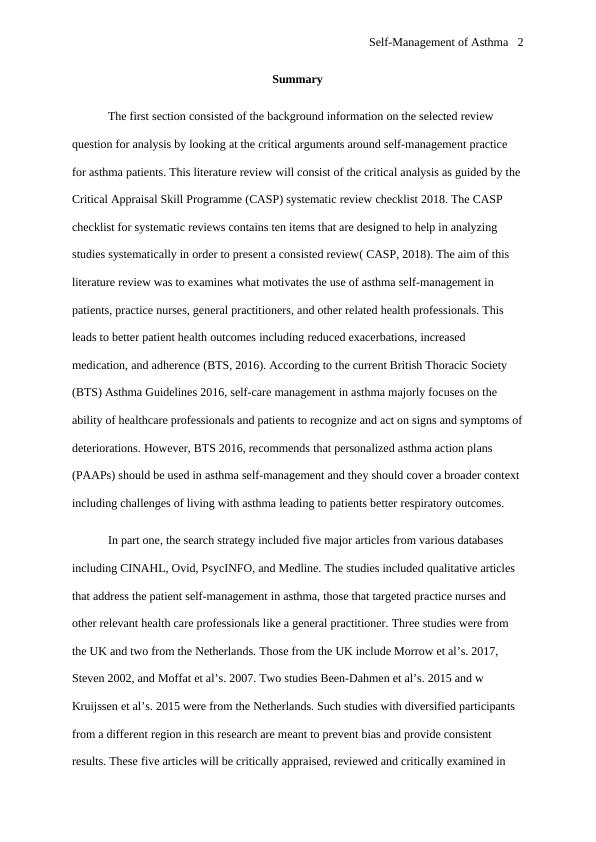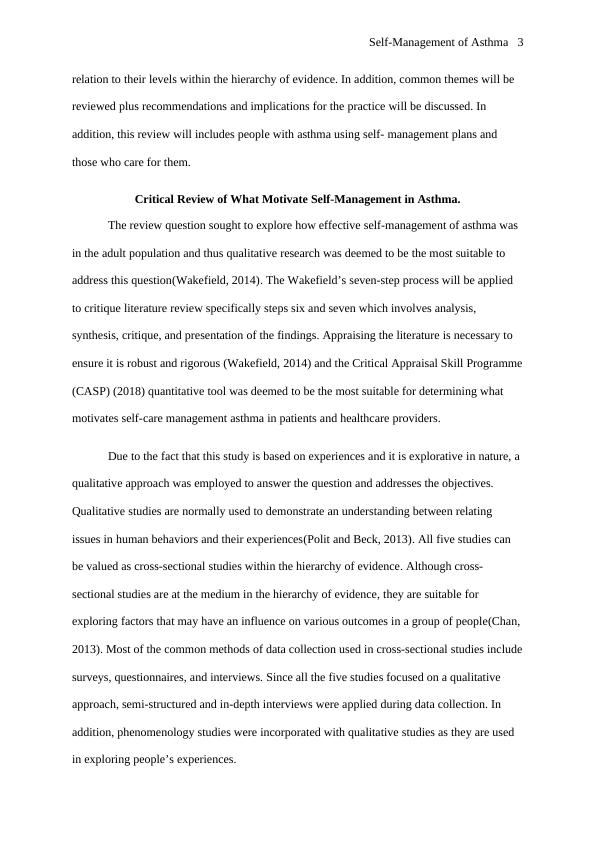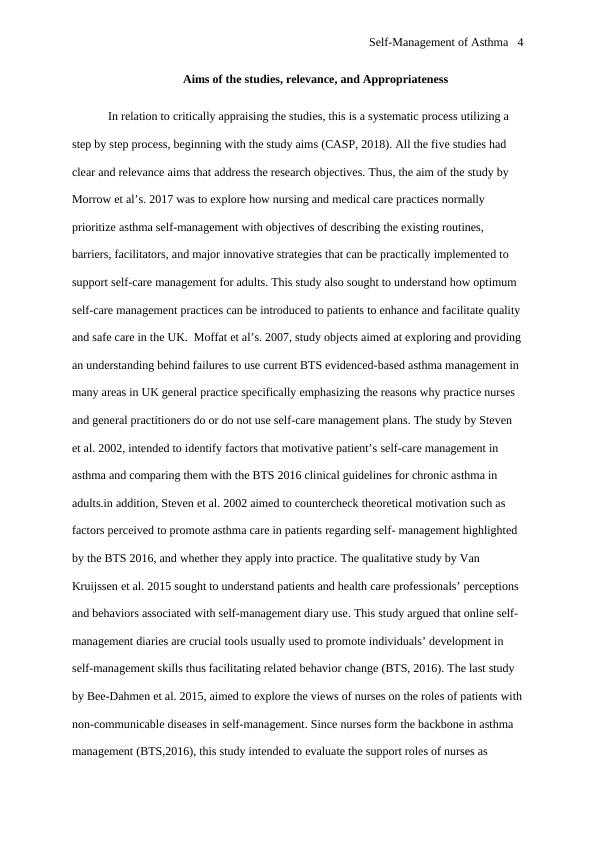What Motivates Self-Management in Asthmatics?
Added on 2023-04-04
17 Pages4599 Words117 Views
Self-Management of Asthma 1
What Motivates Self-Management in Asthmatics?
By Student’s Name
Course + Code
Class
Institution
Date
What Motivates Self-Management in Asthmatics?
By Student’s Name
Course + Code
Class
Institution
Date

Self-Management of Asthma 2
Summary
The first section consisted of the background information on the selected review
question for analysis by looking at the critical arguments around self-management practice
for asthma patients. This literature review will consist of the critical analysis as guided by the
Critical Appraisal Skill Programme (CASP) systematic review checklist 2018. The CASP
checklist for systematic reviews contains ten items that are designed to help in analyzing
studies systematically in order to present a consisted review( CASP, 2018). The aim of this
literature review was to examines what motivates the use of asthma self-management in
patients, practice nurses, general practitioners, and other related health professionals. This
leads to better patient health outcomes including reduced exacerbations, increased
medication, and adherence (BTS, 2016). According to the current British Thoracic Society
(BTS) Asthma Guidelines 2016, self-care management in asthma majorly focuses on the
ability of healthcare professionals and patients to recognize and act on signs and symptoms of
deteriorations. However, BTS 2016, recommends that personalized asthma action plans
(PAAPs) should be used in asthma self-management and they should cover a broader context
including challenges of living with asthma leading to patients better respiratory outcomes.
In part one, the search strategy included five major articles from various databases
including CINAHL, Ovid, PsycINFO, and Medline. The studies included qualitative articles
that address the patient self-management in asthma, those that targeted practice nurses and
other relevant health care professionals like a general practitioner. Three studies were from
the UK and two from the Netherlands. Those from the UK include Morrow et al’s. 2017,
Steven 2002, and Moffat et al’s. 2007. Two studies Been-Dahmen et al’s. 2015 and w
Kruijssen et al’s. 2015 were from the Netherlands. Such studies with diversified participants
from a different region in this research are meant to prevent bias and provide consistent
results. These five articles will be critically appraised, reviewed and critically examined in
Summary
The first section consisted of the background information on the selected review
question for analysis by looking at the critical arguments around self-management practice
for asthma patients. This literature review will consist of the critical analysis as guided by the
Critical Appraisal Skill Programme (CASP) systematic review checklist 2018. The CASP
checklist for systematic reviews contains ten items that are designed to help in analyzing
studies systematically in order to present a consisted review( CASP, 2018). The aim of this
literature review was to examines what motivates the use of asthma self-management in
patients, practice nurses, general practitioners, and other related health professionals. This
leads to better patient health outcomes including reduced exacerbations, increased
medication, and adherence (BTS, 2016). According to the current British Thoracic Society
(BTS) Asthma Guidelines 2016, self-care management in asthma majorly focuses on the
ability of healthcare professionals and patients to recognize and act on signs and symptoms of
deteriorations. However, BTS 2016, recommends that personalized asthma action plans
(PAAPs) should be used in asthma self-management and they should cover a broader context
including challenges of living with asthma leading to patients better respiratory outcomes.
In part one, the search strategy included five major articles from various databases
including CINAHL, Ovid, PsycINFO, and Medline. The studies included qualitative articles
that address the patient self-management in asthma, those that targeted practice nurses and
other relevant health care professionals like a general practitioner. Three studies were from
the UK and two from the Netherlands. Those from the UK include Morrow et al’s. 2017,
Steven 2002, and Moffat et al’s. 2007. Two studies Been-Dahmen et al’s. 2015 and w
Kruijssen et al’s. 2015 were from the Netherlands. Such studies with diversified participants
from a different region in this research are meant to prevent bias and provide consistent
results. These five articles will be critically appraised, reviewed and critically examined in

Self-Management of Asthma 3
relation to their levels within the hierarchy of evidence. In addition, common themes will be
reviewed plus recommendations and implications for the practice will be discussed. In
addition, this review will includes people with asthma using self- management plans and
those who care for them.
Critical Review of What Motivate Self-Management in Asthma.
The review question sought to explore how effective self-management of asthma was
in the adult population and thus qualitative research was deemed to be the most suitable to
address this question(Wakefield, 2014). The Wakefield’s seven-step process will be applied
to critique literature review specifically steps six and seven which involves analysis,
synthesis, critique, and presentation of the findings. Appraising the literature is necessary to
ensure it is robust and rigorous (Wakefield, 2014) and the Critical Appraisal Skill Programme
(CASP) (2018) quantitative tool was deemed to be the most suitable for determining what
motivates self-care management asthma in patients and healthcare providers.
Due to the fact that this study is based on experiences and it is explorative in nature, a
qualitative approach was employed to answer the question and addresses the objectives.
Qualitative studies are normally used to demonstrate an understanding between relating
issues in human behaviors and their experiences(Polit and Beck, 2013). All five studies can
be valued as cross-sectional studies within the hierarchy of evidence. Although cross-
sectional studies are at the medium in the hierarchy of evidence, they are suitable for
exploring factors that may have an influence on various outcomes in a group of people(Chan,
2013). Most of the common methods of data collection used in cross-sectional studies include
surveys, questionnaires, and interviews. Since all the five studies focused on a qualitative
approach, semi-structured and in-depth interviews were applied during data collection. In
addition, phenomenology studies were incorporated with qualitative studies as they are used
in exploring people’s experiences.
relation to their levels within the hierarchy of evidence. In addition, common themes will be
reviewed plus recommendations and implications for the practice will be discussed. In
addition, this review will includes people with asthma using self- management plans and
those who care for them.
Critical Review of What Motivate Self-Management in Asthma.
The review question sought to explore how effective self-management of asthma was
in the adult population and thus qualitative research was deemed to be the most suitable to
address this question(Wakefield, 2014). The Wakefield’s seven-step process will be applied
to critique literature review specifically steps six and seven which involves analysis,
synthesis, critique, and presentation of the findings. Appraising the literature is necessary to
ensure it is robust and rigorous (Wakefield, 2014) and the Critical Appraisal Skill Programme
(CASP) (2018) quantitative tool was deemed to be the most suitable for determining what
motivates self-care management asthma in patients and healthcare providers.
Due to the fact that this study is based on experiences and it is explorative in nature, a
qualitative approach was employed to answer the question and addresses the objectives.
Qualitative studies are normally used to demonstrate an understanding between relating
issues in human behaviors and their experiences(Polit and Beck, 2013). All five studies can
be valued as cross-sectional studies within the hierarchy of evidence. Although cross-
sectional studies are at the medium in the hierarchy of evidence, they are suitable for
exploring factors that may have an influence on various outcomes in a group of people(Chan,
2013). Most of the common methods of data collection used in cross-sectional studies include
surveys, questionnaires, and interviews. Since all the five studies focused on a qualitative
approach, semi-structured and in-depth interviews were applied during data collection. In
addition, phenomenology studies were incorporated with qualitative studies as they are used
in exploring people’s experiences.

Self-Management of Asthma 4
Aims of the studies, relevance, and Appropriateness
In relation to critically appraising the studies, this is a systematic process utilizing a
step by step process, beginning with the study aims (CASP, 2018). All the five studies had
clear and relevance aims that address the research objectives. Thus, the aim of the study by
Morrow et al’s. 2017 was to explore how nursing and medical care practices normally
prioritize asthma self-management with objectives of describing the existing routines,
barriers, facilitators, and major innovative strategies that can be practically implemented to
support self-care management for adults. This study also sought to understand how optimum
self-care management practices can be introduced to patients to enhance and facilitate quality
and safe care in the UK. Moffat et al’s. 2007, study objects aimed at exploring and providing
an understanding behind failures to use current BTS evidenced-based asthma management in
many areas in UK general practice specifically emphasizing the reasons why practice nurses
and general practitioners do or do not use self-care management plans. The study by Steven
et al. 2002, intended to identify factors that motivative patient’s self-care management in
asthma and comparing them with the BTS 2016 clinical guidelines for chronic asthma in
adults.in addition, Steven et al. 2002 aimed to countercheck theoretical motivation such as
factors perceived to promote asthma care in patients regarding self- management highlighted
by the BTS 2016, and whether they apply into practice. The qualitative study by Van
Kruijssen et al. 2015 sought to understand patients and health care professionals’ perceptions
and behaviors associated with self-management diary use. This study argued that online self-
management diaries are crucial tools usually used to promote individuals’ development in
self-management skills thus facilitating related behavior change (BTS, 2016). The last study
by Bee-Dahmen et al. 2015, aimed to explore the views of nurses on the roles of patients with
non-communicable diseases in self-management. Since nurses form the backbone in asthma
management (BTS,2016), this study intended to evaluate the support roles of nurses as
Aims of the studies, relevance, and Appropriateness
In relation to critically appraising the studies, this is a systematic process utilizing a
step by step process, beginning with the study aims (CASP, 2018). All the five studies had
clear and relevance aims that address the research objectives. Thus, the aim of the study by
Morrow et al’s. 2017 was to explore how nursing and medical care practices normally
prioritize asthma self-management with objectives of describing the existing routines,
barriers, facilitators, and major innovative strategies that can be practically implemented to
support self-care management for adults. This study also sought to understand how optimum
self-care management practices can be introduced to patients to enhance and facilitate quality
and safe care in the UK. Moffat et al’s. 2007, study objects aimed at exploring and providing
an understanding behind failures to use current BTS evidenced-based asthma management in
many areas in UK general practice specifically emphasizing the reasons why practice nurses
and general practitioners do or do not use self-care management plans. The study by Steven
et al. 2002, intended to identify factors that motivative patient’s self-care management in
asthma and comparing them with the BTS 2016 clinical guidelines for chronic asthma in
adults.in addition, Steven et al. 2002 aimed to countercheck theoretical motivation such as
factors perceived to promote asthma care in patients regarding self- management highlighted
by the BTS 2016, and whether they apply into practice. The qualitative study by Van
Kruijssen et al. 2015 sought to understand patients and health care professionals’ perceptions
and behaviors associated with self-management diary use. This study argued that online self-
management diaries are crucial tools usually used to promote individuals’ development in
self-management skills thus facilitating related behavior change (BTS, 2016). The last study
by Bee-Dahmen et al. 2015, aimed to explore the views of nurses on the roles of patients with
non-communicable diseases in self-management. Since nurses form the backbone in asthma
management (BTS,2016), this study intended to evaluate the support roles of nurses as

End of preview
Want to access all the pages? Upload your documents or become a member.
Related Documents
Mental Health Nurses' Views and Experiences of Working with Undergraduate Nursing Studentslg...
|10
|4519
|49
Critique of Evidence Based Nursing Research Articleslg...
|15
|4150
|407
Critique Critical appraisal on A RCTlg...
|14
|3492
|49
Assignment on Master of Nursinglg...
|14
|2942
|670
Clinical Governance and Practice Improvementlg...
|12
|2516
|260
Critical Appraisal of Two Journal Articles on Mental Health and Evidence Informed Decision Makinglg...
|9
|3707
|406
